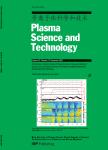Study of Humidity Effect on Benzene Decomposition by the Dielectric Barrier Discharge Nonthermal Plasma Reactor
Study of Humidity Effect on Benzene Decomposition by the Dielectric Barrier Discharge Nonthermal Plasma Reactor作者机构:College of Environmental Science and EngineeringDonghua University College of Electrical and Information EngineeringBeifang University of Nationalities College of ScienceDonghua University
出 版 物:《Plasma Science and Technology》 (等离子体科学和技术(英文版))
年 卷 期:2016年第18卷第6期
页 面:686-692页
核心收录:
学科分类:080901[工学-物理电子学] 0809[工学-电子科学与技术(可授工学、理学学位)] 07[理学] 08[工学] 070204[理学-等离子体物理] 0702[理学-物理学]
基 金:supported by National Natural Science Foundation of China(Nos.11205007 and 11205029)
主 题:relative humidity nonthermal plasma benzene decomposition dielectric barrier discharge
摘 要:The humidity effects on the benzene decomposition process were investigated by the dielectric barrier discharge(DBD) plasma *** results showed that the water vapor played an important role in the benzene oxidation *** was found that there was an optimum humidity value for the benzene removal efficiency,and at around 60% relative humidity(RH),the optimum benzene removal efficiency was *** a SIE of 378 J/L,the removal efficiency was 66% at 0% RH,while the removal efficiency reached 75.3% at 60% RH and dropped to 69% at 80% ***,the addition of water inhibited the formation of ozone and NO2 *** of the concentrations of ozone and NO2 decreased with increasing of the RH at the same specific input *** a SIE of 256 J/L,the concentrations of ozone and NO2 were 5.4 mg/L and 1791 ppm under dry conditions,whereas they were only 3.4 mg/L and 1119 ppm at 63.5%RH,***,the outlet gas after benzene degradation was qualitatively analyzed by FT-IR and GC-MS to determine possible intermediate *** results suggested that the byproducts in decomposition of benzene primarily consisted of phenol and substitutions of *** on these byproducts a benzene degradation mechanism was proposed.



